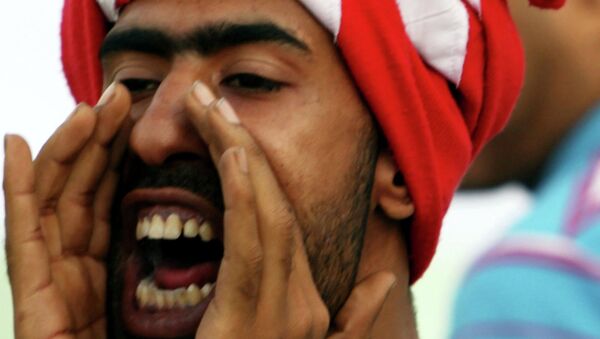Tweeting from the press conference, Ali Abdulemam said: “I hope that the Western world, who say they stand up for human rights, don’t recognise this nationality revocation by Bahrain”.
To be stateless is to not be recognised as a citizen by any state, preventing them from accessing civil, political, economic, cultural and social rights. It’s a legal concept that describes the lack of any nationality.
"@BirdBahrain_: Now speaking at House of Lords: @abdulemam blogger who was made stateless last week pic.twitter.com/zqox1SpMFL"
— Ali Abdulemam (@abdulemam) February 10, 2015
At the beginning of 2015, Bahrain’s Ministry of Interior revoked the citizenship of 72 people. Amongst them are journalists, bloggers and political and human rights activists.
The Ministry of Interior published a statement claiming, “each citizen of Bahrain has the responsibility to act in ways that do not harm the interests of the Kingdom.”
Alongside spying, financing terrorism, participation in terrorist actions, the statement lists: “defaming the image of the regime, inciting against the regime and spreading false news to hinder the rules of the constitution;” “defaming brotherly countries” and “inciting and advocating regime change through illegal means”, as justification for their decision.
We are human rights defenders, but #Bahrain says we’re terrorists @SAlwadaei for @guardian http://t.co/rukvD9BBTd
— Index on Censorship (@IndexCensorship) February 10, 2015
All 72 Bahrainis are now rendered stateless. Ten of them are in the UK.
Bad Timing for Britain
The list of citizens rendered stateless by the Bahraini Interior Ministry was published a week after Britain’s Foreign Secretary Philip Hammond praised the improvements Bahrain had made in its human rights records, which has been criticised by Human Rights Watch and Amnesty International.
Defending the controversial decision to open a British Royal Navy base in the Kingdom of Bahrain, the Foreign Secretary told MPs that the Middle Eastern country was “travelling in the right direction”.
Ali Abdulemam told Sputnik news that he hoped the Western world would exert more pressure on the Kingdom of Bahrain to respect basic human rights.
“The British Government is providing a cover for Bahrain. I wonder if this really is really right direction that Philip Hammond is talking about – stripping 72 people of citizenship without any formal allegations of what they have done."
“Bahrain’s record on human rights abuses is widely known and widely recorded”.
Deeply inspirational stories of #Bahrain resistance from @MARYAMALKHAWAJA. #UK is complicit in oppression. #changehow pic.twitter.com/J6iXl42EHU
— Cam Stocks (@Cam_Stocks) February 8, 2015
And according to the Bahrain Institute for Rights and Democracy (BIRD), Mr. Hammond’s words are an insult. Sayed Alwadaei, advocacy director of BIRD said: “When it comes to Bahrain Britain is failing to champion human rights and is instead siding with a dictatorship”.
Meanwhile Britain’s own position on statelessness has caused controversy in the UK. It used to be unlawful to remove a person’s British citizenship if it meant they would be left stateless.
Mr. Philip Hammond stop your support for the dictator of #Bahrain. @hrw @AmnestyUK @BBCNews @foreignoffice @UN #UK pic.twitter.com/WUeKlOJacK
— Bahrain (@mowalee) January 26, 2015
However following an amendment to the British Nationality Act in 2014, the Home Secretary Theresa May now has the power to revoke British citizenship if someone is deemed to be a threat. Allowing Mrs May the power to grant terror suspects in Britain stateless.
The UN estimates that at least 10 million people have been excluded from citizenship around the world. The office of the UN High Commissioner for Refugees has announced a campaign to eliminate statelessness within a decade.
Ali Abdulemam is due to speak at a conference later this month in London, The Arab Uprisings Four Years On: Revolution, Repression and Resistance.


